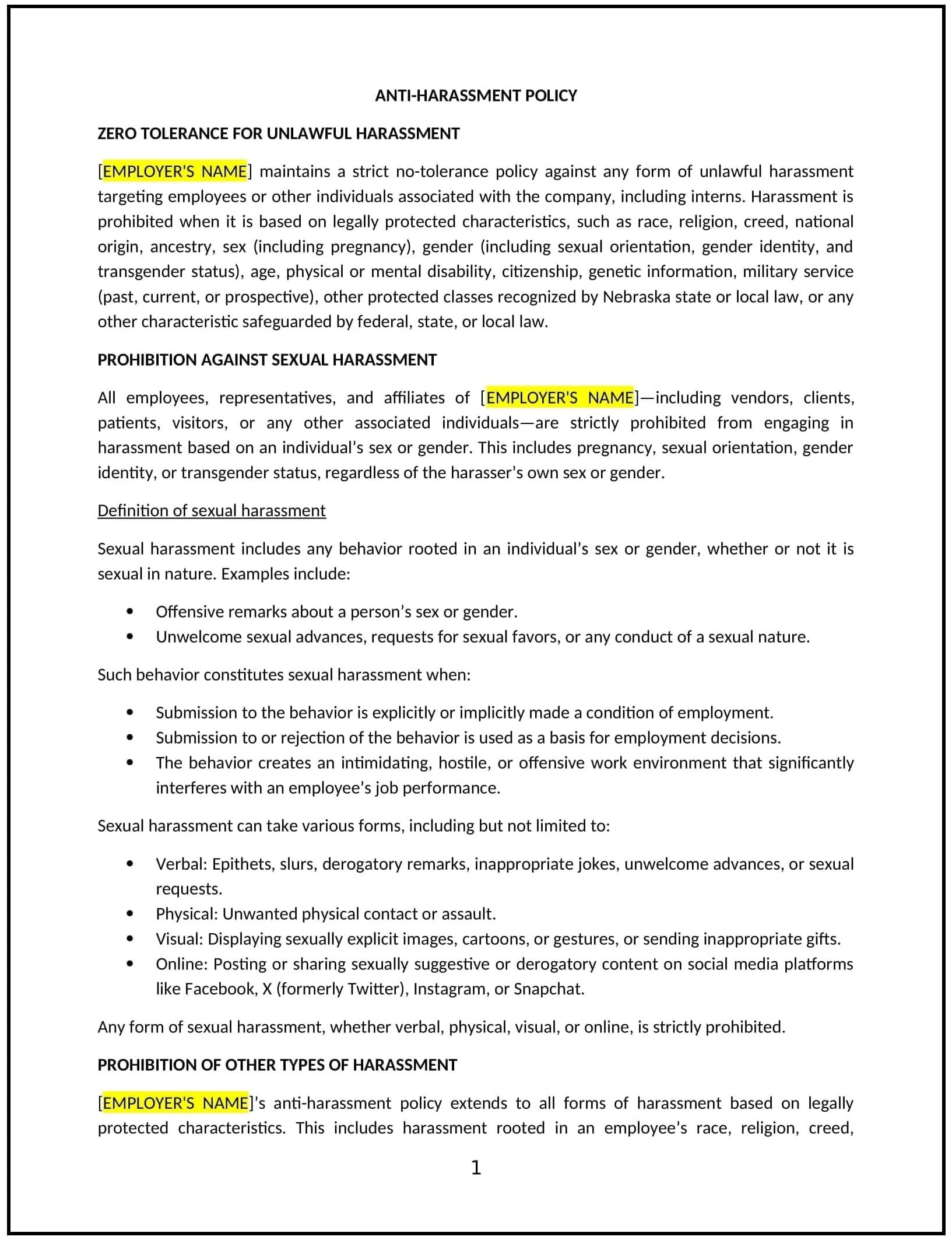Got contracts to review? While you're here for policies, let Cobrief make contract review effortless—start your free review now.

Customize this template for free
Anti-harassment policy (Nebraska)
An anti-harassment policy helps Nebraska businesses foster a respectful and inclusive workplace by setting clear guidelines for identifying, preventing, and addressing harassment of any kind. This policy outlines what constitutes harassment, including verbal, physical, and sexual harassment, and specifies how employees can report incidents, what actions the company will take to investigate claims, and the consequences for violating the policy. It is designed to create a safe environment where all employees feel respected and valued.
By adopting this policy, businesses in Nebraska can mitigate the risks of harassment, protect employee well-being, and ensure that all individuals in the workplace are treated with dignity and respect.
How to use this anti-harassment policy (Nebraska)
- Define harassment: Clearly specify what constitutes harassment, including verbal, physical, visual, and sexual harassment, as well as harassment based on race, color, religion, sex, national origin, disability, age, sexual orientation, or other protected characteristics.
- Establish reporting procedures: Create a clear, confidential process for employees to report harassment, including who they should contact (e.g., HR, a designated compliance officer) and the steps to follow.
- Ensure protection from retaliation: Make it clear that employees who report harassment or participate in an investigation will not face retaliation, and that any retaliation will be treated as a violation of the policy.
- Outline investigation procedures: Define the steps that will be taken to investigate harassment complaints, ensuring that all complaints are handled promptly, thoroughly, and fairly.
- Set disciplinary actions: Specify the potential consequences for employees found guilty of harassment, ranging from counseling and warnings to suspension or termination, depending on the severity of the incident.
- Provide training: Offer training sessions for employees and managers to raise awareness of what constitutes harassment, how to prevent it, and how to address issues if they arise.
- Communicate the policy: Ensure all employees are made aware of the policy during onboarding, through employee handbooks, and by regular reminders and training sessions.
- Review and update: Periodically review and update the policy to ensure it remains aligned with Nebraska state laws, evolving workplace dynamics, and best practices in harassment prevention.
Benefits of using this anti-harassment policy (Nebraska)
This policy provides several benefits for Nebraska businesses:
- Promotes a respectful work environment: By establishing clear guidelines, businesses can promote a workplace where employees are treated with dignity and respect, free from harassment.
- Reduces legal risk: Clear policies and reporting mechanisms help businesses minimize the risk of lawsuits or claims of harassment in the workplace.
- Increases employee morale: A harassment-free workplace fosters higher job satisfaction, loyalty, and productivity, as employees feel safe and valued.
- Ensures fairness: A transparent and consistent approach to addressing harassment helps ensure fairness for all employees and demonstrates the company’s commitment to maintaining an inclusive culture.
- Improves retention: Employees are more likely to stay with a business that actively works to prevent harassment and addresses issues promptly and fairly.
Tips for using this anti-harassment policy (Nebraska)
- Communicate the policy clearly: Ensure employees understand the types of behavior that constitute harassment and how to report any issues they experience.
- Train employees and managers: Regularly offer training on harassment prevention, emphasizing the company’s zero-tolerance stance on harassment and the importance of fostering a respectful work environment.
- Take immediate action: Respond quickly and effectively to harassment complaints, ensuring that all claims are investigated thoroughly and confidentially.
- Foster a culture of inclusion: Encourage employees to treat each other with respect and make it clear that harassment in any form will not be tolerated.
- Review the policy regularly: Periodically assess the effectiveness of the policy and update it to reflect changes in Nebraska state laws, federal guidelines, or best practices in harassment prevention.